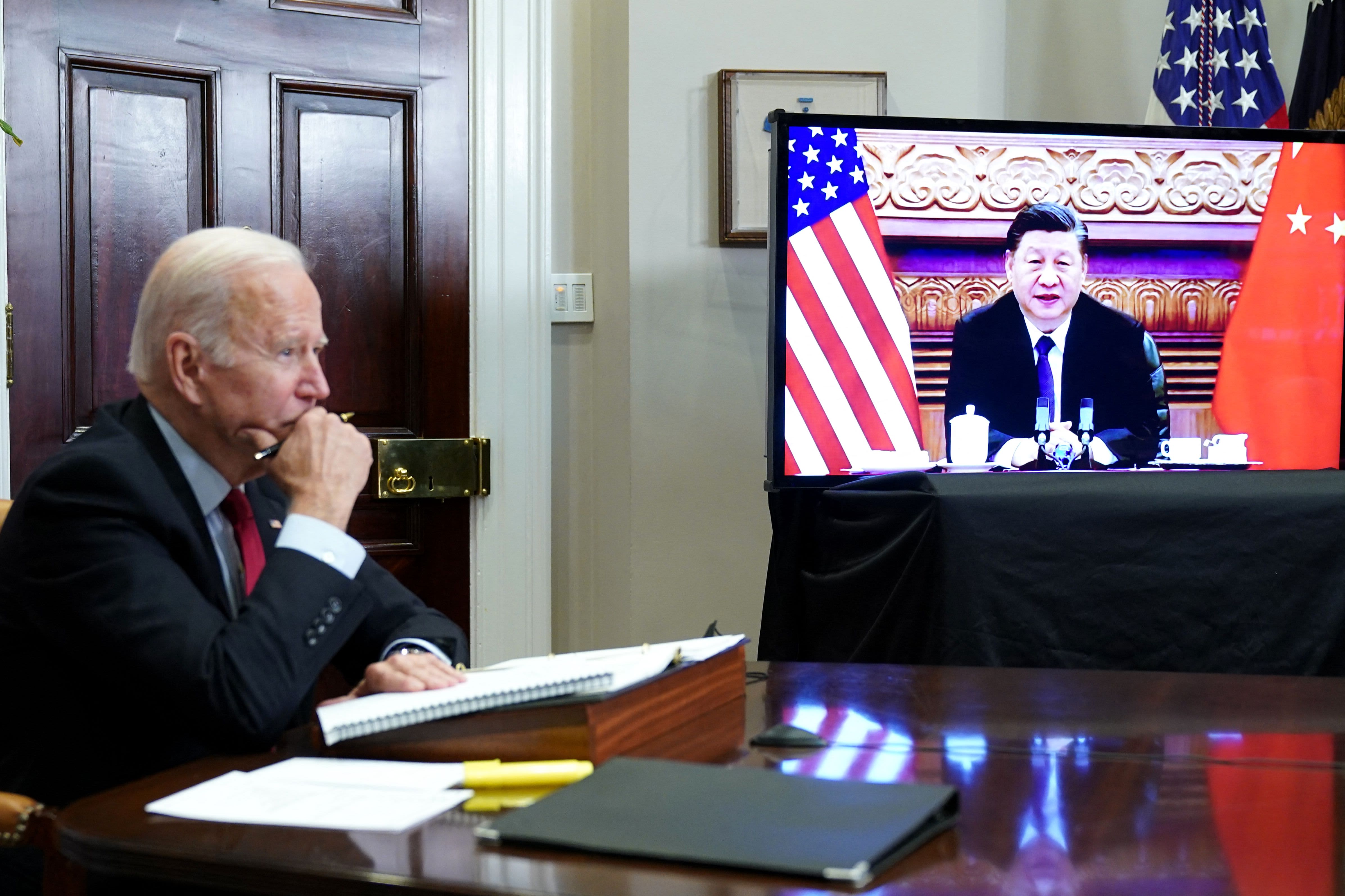Biden-Xi virtual meeting ends with both sides calling for more cooperation amid tensions

US President Joe Biden meets with China’s President Xi Jinping during a virtual summit from the Roosevelt Room of the White House in Washington, DC, November 15, 2021.
Mandel Ngan | AFP | Getty Images
BEIJING — U.S. President Joe Biden and Chinese President Xi Jinping met virtually Tuesday in the closest communication between the two countries’ leaders since Biden took office in January.
Both sides noted points of tension, and issued public statements after the meeting that emphasized ways to avoid conflict.
Biden said there was a “need for common-sense guardrails to ensure that competition does not veer into conflict and to keep lines of communication open,” according to White House readout after the meeting.
Xi said during the meeting that for China and the U.S. to get along “in a new era,” three principles of mutual respect, peaceful coexistence and win-win cooperation should be followed, according to China’s official English-language readout. Beijing typically uses language like “mutual respect” in calling for more favorable terms from the U.S.
Xi also compared the two countries to two large ships, which need to move forward together without colliding, according to a Chinese release.
“The meeting itself was really about the two leaders discussing ways to manage the competition between the United States and China responsibly,” a senior Biden administration official told reporters in a call.
On Taiwan, there was “nothing new established in the form of guardrails or other understandings,” the official said adding that the Beijing Winter Olympics and visa issues did not come up during the virtual meeting. “We were not expecting a breakthrough. There were none to report,” the official said.
“The meeting [was] wide-ranging, in-depth, candid, constructive, substantive and productive,” Foreign Ministry Spokesperson Hua Chunying said in English on Twitter. “It helps increase mutual understanding.”
As expected, economic issues were part of the two leaders’ conversation, without any specific conclusions.
Biden “underscored the importance of China fulfilling its Phase One [trade deal] commitments,” the official said, adding that trade was not a dominant part of the conversation.
U.S.-China tensions
Tensions between the two nations escalated under former U.S. President Donald Trump, beginning with trade and tariffs on billions of dollars’ worth of goods.
The leaders ended the meeting shortly before 12:30 p.m. Beijing time (11:30 p.m. ET Monday), almost four hours after it began, according to Chinese state media.
The virtual meeting kicked off with a positive tone and cordial remarks. Xi said he was “very happy” to see his “old friend,” while Biden said the two “have never been that formal with one another,” according to a White House readout of the meeting’s opening remarks.
Our responsibility as leaders of China and the United States is to ensure that the competition between our countries does not veer into conflict, whether intended or unintended.
Joe Biden
U.S. President
Biden said the leaders’ responsibility was “to be clear and honest where we disagree, and work together where our interests intersect, especially on vital global issues like climate change.”
“Our responsibility as leaders of China and the United States is to ensure that the competition between our countries does not veer into conflict, whether intended or unintended,” the U.S. president said. “Just simple, straightforward competition.”
Both leaders said it would be better to meet in person, and called for increased communication.
The Chinese leader also “expressed his readiness to work with President Biden to build consensus and take active steps to move China-US relations forward in a positive direction,” according to China’s Ministry of Foreign Affairs. Xi emphasized the necessity of a “sound and steady” relationship between the two countries, the press release said.
China’s Vice Premier Liu He, Foreign Minister Wang Yi and Vice Foreign Minister Xie Feng joined the virtual meeting, along with Ding Xuexiang, director of the general office of the CCP’s central committee, and Yang Jiechi, director of the committee’s foreign affairs office.
On the U.S. side, attendees included Treasury Secretary Janet Yellen, Secretary of State Antony Blinken and National Security Advisor Jake Sullivan. Three representatives from the National Security Council also joined: Kurt Campbell, deputy assistant to the president and coordinator for the Indo-Pacific; Laura Rosenberger, special assistant to the president and senior director for China; and Jon Czin, director for China.




